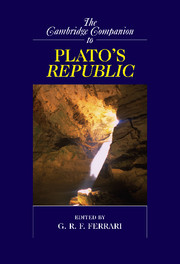Book contents
- Frontmatter
- 1 The Protreptic Rhetoric of the Republic
- 2 The Place of the Republic in Plato’s Political Thought
- 3 Rewriting the Poets in Plato’s Characters
- 4 Wise Guys and Smart Alecks in Republic 1 and 2
- 5 Justice and Virtue: The Republic’s Inquiry into Proper Difference
- 6 The Noble Lie
- 7 The Three-Part Soul
- 8 Eros in the Republic
- 9 The Utopian Character of Plato’s Ideal City
- 10 Philosophy, the Forms, and the Art of Ruling
- 11 Sun and Line: The Role of the Good
- 12 Beginning the “Longer Way”
- 13 The City-Soul Analogy
- 14 The Unhappy Tyrant and the Craft of Inner Rule
- 15 What Is Imitative Poetry and Why Is It Bad?
- 16 The Life-and-Death Journey of the Soul: Interpreting the Myth of Er
- Bibliography
- Index of Passages
- Index of Names and Subjects
- Series List
2 - The Place of the Republic in Plato’s Political Thought
Published online by Cambridge University Press: 28 November 2007
- Frontmatter
- 1 The Protreptic Rhetoric of the Republic
- 2 The Place of the Republic in Plato’s Political Thought
- 3 Rewriting the Poets in Plato’s Characters
- 4 Wise Guys and Smart Alecks in Republic 1 and 2
- 5 Justice and Virtue: The Republic’s Inquiry into Proper Difference
- 6 The Noble Lie
- 7 The Three-Part Soul
- 8 Eros in the Republic
- 9 The Utopian Character of Plato’s Ideal City
- 10 Philosophy, the Forms, and the Art of Ruling
- 11 Sun and Line: The Role of the Good
- 12 Beginning the “Longer Way”
- 13 The City-Soul Analogy
- 14 The Unhappy Tyrant and the Craft of Inner Rule
- 15 What Is Imitative Poetry and Why Is It Bad?
- 16 The Life-and-Death Journey of the Soul: Interpreting the Myth of Er
- Bibliography
- Index of Passages
- Index of Names and Subjects
- Series List
Summary
The project of this chapter is in outline simple. I first argue (section I) that somehow or other Socrates, and what I shall broadly call the “Socratic conception of philosophy,” are fundamental to Plato's political thinking in all periods of his writing (however these are to be defined), and I try to explain both why that should be so and what the consequences are for our understanding of Plato's political thought. I then (section II) go on to discuss the relationship of this Socrates - the one who, as I shall propose, stands constantly behind Plato as he reflects politically - to Callipolis, the second city of the Republic (second, that is, after Socrates' “city of pigs,” as Glaucon calls it). To put it in a more punchy way, in this second section of the chapter I ask about the precise relationship between Socrates, the main speaker throughout the Republic, and the philosopher-rulers of the second city he is made by the author to construct.
But first, a couple of preliminaries.
The old, simplistic, late twentieth-century account of Plato’s political philosophy is now, in my view, dead and buried: the sort of account that has him starting out (in the Republic) with the ideal of rule by philosophers, then (in Politicus and Laws) rethinking that ideal and becoming a constitutionalist, even if, as he rethinks, he still looks back wistfully to the earlier dream. Closer readings have in my view demonstrated beyond all reasonable doubt that this account radically misinterprets all three dialogues (i.e., Republic, Politicus, and Laws); it will no doubt persist among the wider public for a time, but it will and should be replaced eventually by a more nuanced story of Plato’s political thought and its evolution.
- Type
- Chapter
- Information
- The Cambridge Companion to Plato's Republic , pp. 27 - 54Publisher: Cambridge University PressPrint publication year: 2007
- 6
- Cited by

